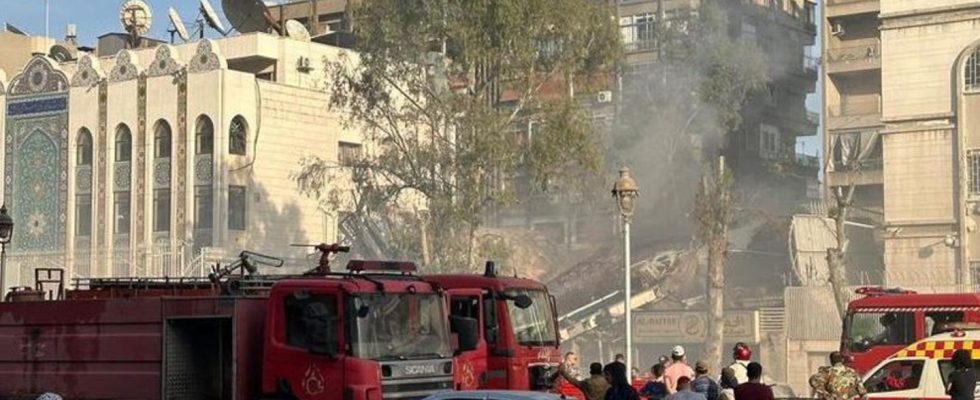Damascus
Iran’s Revolutionary Guard: Death of two generals in Syria
The destroyed building on the grounds of the Iranian embassy in Damascus. photo
© Hummam Sheikh Ali/XinHua/dpa
Israel regularly bombs targets in Syria. Now two generals from the powerful Revolutionary Guard have been eliminated. The attack hit an embassy building. How does Tehran react?
In a suspected Israeli airstrike in the Syrian capital According to information from Tehran, two generals of the Iranian Revolutionary Guards (IRGC) have been killed in Damascus. The two brigadier generals Mohammad Reza Sahedi and his deputy Mohammad Hadi Haji were killed, the IRGC said. Five other members of the Revolutionary Guard were killed in the attack.
Iran blames Israel for the deadly attack on the consular section of the Iranian embassy in Damascus. Sahedi was responsible for operations in Syria and Lebanon, according to the Iranian news agency Tasnim.
When asked, the Israeli army said it does not comment on reports in the foreign media.
According to the Syrian state news agency Sana, the explosion targeted the consular section immediately next to the Iranian embassy building. Accordingly, the entire building was destroyed. Images on social media showed heavy smoke and debris next to the main Iranian embassy building. The Syrian air defense responded to the attack and shot down some missiles, it said.
Reactions in Iran
In the Iranian capital Tehran, hundreds of government supporters gathered in the city center for spontaneous protests, eyewitnesses reported. The crowd demanded revenge for the killing of the generals. They shouted, among other things, “Death to Israel” and “Death to America.”
Iran’s foreign ministry spokesman Nasser Kanaani strongly condemned the attack and blamed Israel’s arch-enemy for the killing of the IRGC generals. “The dimensions of this hateful attack are being investigated and responsibility for its consequences lies with the aggressive Zionist regime,” the spokesman said, according to a statement from his ministry. “The Islamic Republic of Iran reserves the right to take countermeasures and will decide the nature of the response,” he added.
Serious allegations against Netanyahu
Iran’s Foreign Minister Hussein Amirabdollahian strongly condemned the alleged Israeli attack. Shortly after the explosion, he telephoned his Syrian colleague Faisal al-Mikdad. At the same time, he made serious allegations against Israel’s head of government. “Netanyahu has completely lost his mental balance due to the Israeli regime’s constant defeats in Gaza and failure to achieve the ambitious goals of the Zionists,” the minister said, according to a statement from the Iranian Foreign Ministry.
The residence of Ambassador Hussein Akbari was located on the ground floor of the affected part of the building, Iran’s state media reported. However, the diplomat and his family were unharmed, it was said. No employees were likely to have been there because of a religious holiday. Akbari was at his workplace at the time of the attack, the ambassador told reporters. He spoke of six rockets that hit the consular building.
Hamidreza Azizi, visiting researcher at the Berlin Foundation for Science and Politics, spoke of a “significant escalation of tensions”. In his opinion, some in Iran could even see the air strike as a declaration of war. Iran’s leadership is faced with a difficult decision. The lack of an answer could be interpreted as weakness among supporters. “However, any reaction carries the risk of expanding the conflict,” the expert wrote on X, formerly Twitter.
Israel’s air force repeatedly bombs targets in neighboring Syria in an attempt to prevent Iran and its allied militias such as the Lebanese Hezbollah from expanding their military influence in the country. Attacks have increased since the Gaza war began almost six months ago. Targets near Damascus were already bombed on Sunday. Iranian military personnel are officially only active in Syria in an advisory capacity. However, alongside Russia, Tehran is considered the most important ally of the Syrian government under ruler Bashar al-Assad. A civil war has been raging in the country since 2011.
On Friday, more than 50 people were killed in heavy air strikes in northwest Syria’s Aleppo province. According to the Observatory for Human Rights, most of the victims were Syrian military personnel. Members of the Shiite Hezbollah militia were also among the victims, it was said. However, such high numbers of victims as a result of suspected Israeli air strikes are rare.
background
At the end of December, Iranian General Sejed-Rasi Mousavi, a senior IRGC member, was killed in a suburb of the Syrian capital Damascus in a suspected Israeli airstrike. Iran’s Revolutionary Guards responded in mid-January with massive rocket attacks in retaliation against targets in Syria and Iraq. The rockets flew around 1,200 kilometers. This was also interpreted by observers as a clear signal to Israel. It would be roughly the same distance that rockets from the west of the country would need to reach Tel Aviv or Jerusalem.
The Revolutionary Guards are Iran’s elite armed forces and are considered significantly more powerful than the regular army. Founded after the Islamic Revolution in 1979, the unit is intended to prevent a coup and protect the state ideology. The IRGC also operates abroad with the so-called Al-Kuds Brigades.
Since the 1979 revolution, the USA and Israel have been considered Tehran’s arch enemies. The Revolutionary Guards in particular have therefore expanded their influence in the region under their generals. Four years ago, the US killed one of the most powerful generals, Ghassem Soleimani, in a targeted drone strike in Baghdad. To this day, the former commander of the IRGC foreign unit is revered as a martyr among loyal system supporters. No other commander has achieved comparable prominence since then.
Israel’s government did not officially comment on the airstrike. “It seems that Iran is finally paying the price for being involved in most of the attack activities against Israel,” wrote Tamir Hayman, former head of Israeli military intelligence, shortly afterwards on X. He spoke of one of the most important targeted killings since Soleimani.

